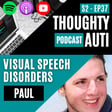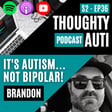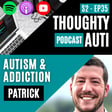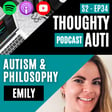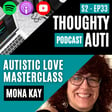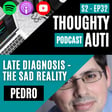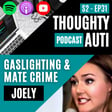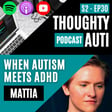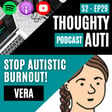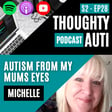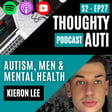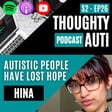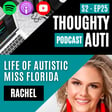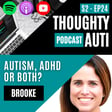
CBD And Autism In Adults - Snake Oil or Salvation? w/Planthaya
What are the benefits of CBD for autistic people? Can CBD replace alcohol at social events? How do you know if a CBD product is safe and trustworthy? What are the side effects of CBD? Can CBD interact with medication?
In this episode of the Thoughty Auti Podcast, Thomas Henley talks to Stacey - The founder of the start-up CBD company Planthaya and previous social worker at FUSION - a service that helps incorporate autistic adolescents into mainstream provisions
In a bid to understand the mainstream confusion around CBD, Thomas and Stacey get things started by talking about the many CBD products available in the UK market. With products ranging from (but not limited to): CBD pillowcases, CBD vape pens, CBD energy drinks, CBD capsules, CBD skin cream and CBD oil drops... understanding what products will benefit you can be exceptionally tricky for newcomers!
Kicking off the CBD discussion, they discuss the difference between CBD (Cannabidiol) and THC (Tetrahydrocannabinol). Stacey highlights that whilst THC produces the 'high' feeling associated with marijuana, CBD creates an absence of feeling - for example, THC can produce euphoria and relaxation, but CBD can reduce feelings of stress/anxiety.
Although they don't dismiss the medical benefits of THC, it has been implicated in exacerbating tendencies towards paranoia and schizophrenia, as well as creating dependency among susceptible individuals. CBD on the other hand, has numerous studies that demonstrates its safety in treating many anxiety, sleep, pain and inflammatory disorders - although not without downsides.
The endocannabinoid system is a very real part of human biology; with CBD1 receptors in the central nervous system (brain/spinal cord) and CBD2 receptors in the periphery (skin, immune system and organs), it's hard not to see promise in the medical use of cannabinoids. CBD is a food supplement, but don't dismiss its strong effects on the body.
Getting down into the meat of the podcast, the benefits and drawbacks of CBD for autistic people was a hot topic of conversation. Thomas hails CBD as an effective replacement to benzodiazepines and alcohol for his anxiety, and Stacey dives into the many ways CBD can help social anxiety, sleep quality and GI tract disorders - things common too many autistic people.
How do read a Certificate of Analysis, what's the difference between isolate, broad-spectrum and full-spectrum, what dose of CBD is right for you, and can CBD be used to manage mental health disorders?
In March 2021 the UK will give CBD the 'Novel Food License' to help with its regulation, so although the UK is decades behind many US states in terms of policies, there is a lot of promise in the future of CBD!
If you have an exciting or interesting story and want to appear on the next podcast, please contact me at: aspergersgrowth@gmail.com
Staceys Links:-
Website - https://planthaya.com/
Instagram - https://www.instagram.com/planthaya/
▬▬▬▬▬▬▬▬▬▬▬▬▬▬▬▬▬▬▬▬▬▬▬▬▬▬▬▬▬
Support via Patreon! - https://www.patreon.com/aspergersgrowth
Social Media ♥
☼ Facebook - Aspergers Growth
☼ Twitter/Instagram - @aspergersgrowth
♫ Track: [Chill Music] Ikson - Reverie [No Copyright Music]






